Abstract: Energy literacy, defined by the DOE, “is an understanding of nature and role of energy in the universe and in our lives” and, “…is also the ability to apply this understanding to answer questions and solve problems” (U.S. Department of Energy, 2013). Energy literacy is continuously evolving with the development of new feedstocks, technologies, and processes – all of which contribute to the changing landscape of energy production and use. In order for energy education to evolve with the energy field, better tools are needed to assess educational programs. The assessment discussed here is a step towards developing such an assessment for bioenergy.
Continue ReadingIn this program and practices feature, we describe two different models of teacher professional development designed to help teachers build their own energy literacy while gaining tools to bring energy literacy to their classrooms. Through a review of the literature we identify principles by which to compare and evaluate the two approaches. Both were successful in helping teachers to build energy literacy; each had a mix of advantages and disadvantages when compared to the literature.
Continue Reading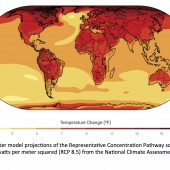
Energy education, vital though it is, remains incomplete if it doesn’t explicitly address the impacts of human activities, specifically the combustion of buried solar energy/fossil fuels, on the environment in general and climate system in particular. Projections based on current emission trends indicate a likely increase of the radiative forcing of energy in the Earth system from around three waters per meter squared today to over eight by the year 2100, substantially heating the planet in the process. Efforts to avoid or minimize the connection between human energy consumption and changing climate amount to a form of science denial through omission. In order to address the causes, effects, and risks of climate change and appreciate the range of options to minimize negative impacts and maximize resilience, energy and climate literacy efforts should be combined and ideally infused throughout the curriculum.
Continue Reading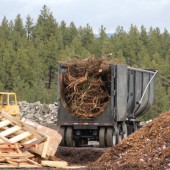
The Northwest Advanced Renewables Alliance (NARA) is a biofuel research project that includes a holistic educational approach to energy literacy. NARA research is focused on woody biomass as a feedstock for biofuels and associated co-products, particularly in the forested areas of the U.S. Pacific Northwest. Extending beyond the science of biofuels, the NARA project examines many social elements of our energy economy, including education. Projects that can combine research and connections to educational venues provide excellent opportunities to expand the impact of grant funded proposals. Keys to making this possible include coordination across disciplines, interpretation of research results, and research processes in the field coupled with investment into integrated educational strategies within the project. This paper outlines elements of the NARA approach to energy literacy, offering strategies for approaches to broader impacts in projects beyond the energy sector.
Continue Reading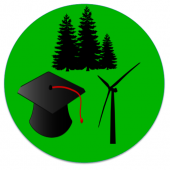
Linking ecology and energy literacy efforts is an essential step for producing scientifically literate citizens who are able to make informed choices about energy, yet the two literacies have developed independently. To explicitly link these, we explored the interface between ecology, energy and education by inviting experts from diverse fields to share perspectives on how to improve public literacy in ecology and energy. This paper presents a synthesis of three organized sessions at the Ecological Society of America (ESA) August 2014 annual meeting: a symposium on a broad range of issues related to energy, ecology and sustainability; an organized oral featuring innovative approaches using ecological concepts to educate Kindergarten through college students about energy, and a share-fair where these innovations were demonstrated. Presentations represented all age-levels, non-formal and formal education, the geophysical sciences, public policy experts, government agencies, ecologists and sociologists, faith-based and environmental non-profits.
Diverse, creative and innovative educational approaches are underway, with major government funding attesting to their import. For ecologists, most of the energy applications centered on sustainability issues, and focused on climate change caused by fossil fuel development. Emerging considerations include direct impacts of energy development and transmission on ecosystems. Conversely, energy literacies should consider the role of ecology, given the ecological impacts involved in decisions about energy extraction and transport. General public audiences including environmental, faith-based and environmental justice communities are increasingly considering environmental dimensions in energy decisions and policy outreach but often on single, time-sensitive issues. Adult education would benefit from a more comprehensive integration of energy and ecology.
We propose that including an explicit ecology dimension in the energy literacies, and similarly involving energy application in the ecology literacies, would be synergistic and allow these inclusive and inherently interdisciplinary fields to flourish and best serve our educational goals of achieving an informed citizenry.
Continue Reading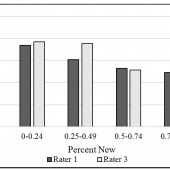
National efforts in energy education aim to increase energy literacy and a diverse set of tools is needed to assess the effectiveness of different educational endeavors. As an alternative to the standard testing-based approach for determining individual energy knowledge, this research further advances a rubric-based approach for assessing the energy literacy manifested in artifacts of a competition or project. The goals were to add additional validity, determine if revisions to the rubric and assessment process increased reliability over the initial study on abstracts, and to determine how well suited the approach is for application to posters – the final deliverable of the competition. The rubric was applied to abstracts and posters from Imagine Tomorrow, a high school energy competition, and the resulting scores were analyzed for both standard rater reliability measures and variable-linked trends. Results showed that interrater reliability on the abstract assessment was similar to that of the previous study, the poster assessment showed much higher reliability than the abstract assessment, and many of the same energy literacy trends identified in the previous research were present with additional data allowing for further trend investigation in this study. While this refinement did not appear to contribute to higher reliability, it has created a rubric that is more user friendly and valid. This study has preliminarily demonstrated that the rubric approach may be more appropriate for artifacts with more information, such as posters or reports, than for brief summaries, such as abstracts. In the posters, some trends based on competition variables were able to be identified. This constitutes the next step toward an implementable approach that has the potential to assess certain energy education endeavors.
Continue ReadingReimagining energy education involves moving beyond the basics of energy use, conservation, and efficiency toward a more robust exploration of energy. This exploration should address energy access and equity, the impacts of energy choices, and personal attitudes, beliefs, and behaviors related to sustainable energy solutions. One approach to encourage this evolution is to use a learning context that inspires educators and students to delve deeply and methodically into the social, economic, and environmental interconnections of energy issues—in other words, to learn about energy within the context of global sustainability. In this article, we share Facing the Future’s definition of global sustainability education (GSE), explain why GSE is an effective context for energy education, and use Facing the Future’s newest energy curriculum to demonstrate how GSE can be employed to develop engaging and rigorous interdisciplinary energy curriculum.
Continue Reading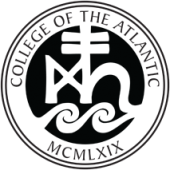
Mitigating climate change is among the most urgent challenges humans face. However debate regarding sustainable energy and options for reducing carbon dioxide emissions tend to be polarizing and frequently unproductive. Too often facts are lost in jargon and numbers that have little meaning for many, including policy makers. Further compounding the problem is the lack of a tangible connection for most citizens between fossil fuel use and environmental degradation. This lack of understanding limits our ability to have sensible discussions about our climate and energy future. A human ecological approach to teaching energy literacy is essential to ensure responsible environmental stewardship in the age of climate change. A powerful and effective way to address this is through project-based learning that helps prepare students, across disciplines, by providing them with the knowledge, skills, and habits of mind to be effective advocates for energy choices that reduce environmental harm. Having an informed and energy literate society is crucial to overcoming barriers and adopting policies that address climate change.
Continue Reading